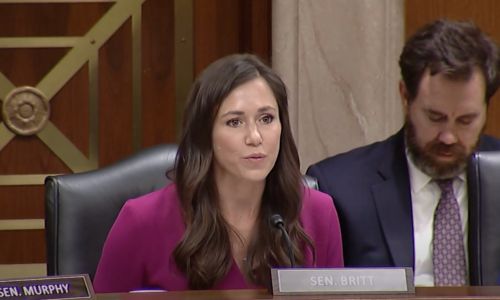Washington, D.C. — U.S. Senator Katie Britt (R-Ala.), Chair of the Homeland Security Appropriations Subcommittee, led a hearing on Monday to examine the Trump Administration’s Fiscal Year 2026 (FY26) budget request for the U.S. Department of Homeland Security (DHS). The session featured testimony from Secretary of Homeland Security Kristi Noem and focused on border security, immigration enforcement, and funding priorities within DHS.
In her opening remarks, Senator Britt credited President Trump’s immigration policies with reducing unlawful border crossings, stating that recent data shows record-low numbers of encounters at the southern border. She emphasized the importance of maintaining momentum by investing in resources for Border Patrol agents and strengthening interior enforcement.
“We must continue to empower Border Patrol,” Britt said, while noting the need for continued support for law enforcement and removal efforts targeting individuals in the country unlawfully.
Britt also highlighted DHS-related programs and facilities in Alabama, pointing to collaborative research with universities, the Homeland Security Investigations (HSI) National Academy in Huntsville, and FEMA’s Center for Domestic Preparedness in Anniston. She noted these as examples of the state’s significant contributions to national security.
While the administration’s full FY26 budget request had not yet been released, Britt expressed interest in several aspects, including support for eliminating funding for the Shelter and Services Program and the potential redirection of resources within agencies such as FEMA, the Cybersecurity and Infrastructure Security Agency (CISA), and the Transportation Security Administration (TSA). She called for increased base funding for U.S. Customs and Border Protection (CBP) and U.S. Immigration and Customs Enforcement (ICE).
During the hearing, Britt also referenced recent criminal incidents involving undocumented immigrants, including the murders of Laken Riley and Rachel Morin, and argued for stronger enforcement to prevent similar tragedies.
In response to Britt’s questioning, Secretary Noem outlined key funding priorities for DHS, citing the need for updated technology, increased personnel for CBP and ICE, and expanded border wall construction. She also emphasized cybersecurity improvements under CISA and the modernization of TSA infrastructure.
“We’re looking at how we conduct operations, training for law enforcement, and ensuring our systems that run critical infrastructure are protected,” Noem said.
Britt also questioned Noem on the efficacy of physical barriers at the border. Noem noted that over 700 miles of border wall are currently in operation, with an additional 77 miles constructed during the Trump Administration. She added that new construction would account for local topography and cooperation with state and tribal authorities.
Britt has introduced the WALL Act in the current Congress, a proposal that seeks $25 billion in funding to complete the southern border wall. The legislation outlines funding mechanisms including closing loopholes and cutting federal benefits for undocumented immigrants, aiming to fund construction without raising taxes or increasing the national debt.
The hearing was part of the subcommittee’s ongoing review of DHS operations and budget needs, and further deliberations are expected as the full FY26 budget is finalized.












